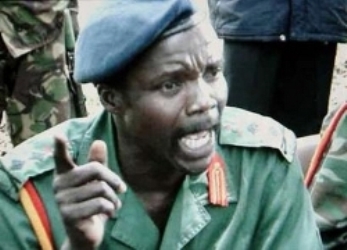LRA says Kony 2012 video an act of “deception and manipulation”
By Julius N. Uma
April 8, 2012 (JUBA) – Central African rebel group the Lord’s Resistance Army (LRA) has criticised an online viral video attempting to make its leader “famous” in a bid to galvanise the international community into action to end the quarter-of-a-century old conflict.
The Kony 2012 video has been viewed over 100 million times on youtube and over video sharing sites but has attracted criticism from a number of quarters for being over simplistic; advocating a military solution rather than dialogue; ignoring existing efforts to end the insurgency; misleading viewers about current events in Uganda and promoting “slacktivism” – a term describing activism that only involves sharing links on social media without taking any meaningful action.
Invisible Children who produced the 30 minute film said the criticism was “myopic” and responded to the intense criticism they have received since the film was released a month ago with a follow up video ‘Kony 2012: Part II Beyond Famous’ to address issues raised against them and outline the next stage of its advocacy campaign.
Reacting to the release of the original film nearly a month ago the LRA issued a statement on 4 April, describing Kony 2012 as a “clear act of malevolent deception and manipulation of world mass consciousness”.
In a copy of the LRA’s 18-page statement obtained by Sudan Tribune the rebel group said that the video was ‘façade’ for the ‘the United States’ led “Rambo” type military campaign in Central Africa.’
‘Behind “KONY 2012” lurks the USA which is not a ‘banana republic’ state, but a world hegemonic power that runs a vast global network of war, intelligence and security institutions, and a myriad of their humanitarian front and service organisations,” party’s reads the LRA’s 4 April statement.
The LRA claims that advocacy group Invisible Children is being used by the US government “to cover up on many occasions for the vile acts of the US supported military regime of Uganda.”
The rebel group also accuses the advocacy group of ignoring the “dirty war” being carried out by the Ugandan army and the abuses carried out by the government.
Formed in Uganda in 1987, the LRA are notorious for targeting civilians especially children, forcing boys to become child soldiers and girls to become sex slaves.
Following an offensive by the Ugandan army in 2002 the LRA has been largely forced to operate in neighbouring South Sudan, Central African Republic and Democratic Republic of Congo, where its atrocities continued.

However, the LRA is now fought to have no more than few hundred soldiers with its groups split across the Central African region making them hard to track. Last year US president Barak Obama sent 100 military advisers to assist the four regional armies attempting to eradicate the group.
Maintaining the US military assistance to the Ugandan army is one of the key features of Kony 2012. Critics of the film have questioned this methodology considering the UPDF’s poor human rights record, especially in Acholi areas of northern Uganda where the LRA originated.
The United Nations and African Union have backed up regional efforts with a 5,000 strong joint military operation to end the LRA rebellion and capture its elusive leader, who together with two senior commanders are wanted by International Criminal Court (ICC).
However, the LRA have scoffed at the military strategy, saying the wars against African guerrilla movements have never been resolved through “decisive military campaigns” and “naked frontal confrontation”.
The LRA are not the only critics adopting a military solution, Sam Olara, editor of the Acholi Times is among those who argue that the Kony 2012 film should have advocated for dialogue rather than the military option.
(ST)
For Ugandan perspectives on the LRA and issues affecting the Acholi people in northern Uganda watch this documentary about region directed by Marjok Oosterom.
The Governance Gap was filmed while Oosterom was researching her PhD and takes a very different angle than the Kony 2012:
The documentary shows the stories of people from villages in the Acholi sub-region of Uganda, who were affected by Kony’s Lord’s Resistance Army for 20 years. The people tell how their experiences of living in war and displacement camps has affected their lives and participation in society.
